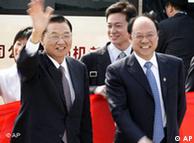中国 | 2008.06.16
台海关系:一场复杂游戏还刚刚开始
上周中国大陆海协会和台湾海基会在北京重开协商会谈,并签署有关周末包机和大陆游客赴台旅游的协议。这是两岸两会在中断9年后的首次对话,各地中文媒体予 以高度评价,称之为历史性的会谈,并对两岸关系的改善寄予极大期望。这样的期望是否现实?这次对话对台海关系的前景将产生怎样的影响?德国之声记者就此采 访了德国科隆大学台湾问题专家哈尔伯艾森。
德国之声:海协会和海基会此次会谈签署了有关周末包机和大陆游客赴台旅游的协议,这是不是这次会谈最重要的成果?
哈尔伯艾森:会谈最主要的成果是,双方在中断相当长一段时间后,重新开启了对话。此外,这两个协议为进一步的谈判开了个头,使 双方触及两岸关系中更具难度的实质性问题成为可能,对话将向什么方向发展,还有待观察。
德国之声:您认为哪些问题更有难度?
哈尔伯艾森:根本问题是确定台海两岸的长期关系。现在达成的两个协议只是一种谨慎的开放措施。尤其是包机的做法,如果我们看得远一些的话,更是对台 湾主体性的一种保护。因为如果包机的目的是将来实现定期直航,这就让台商有可能把家人留在台湾,自己往返于大陆和台湾,而不是在大陆定居。
德国之声:海协会和海基会在会谈中还谈到了在台北和北京互设办事机构。台湾和海外媒体对这一规划十分重视。您认为这是一个关键的步骤吗?
哈尔伯艾森:据我掌握的信息,目前这一规划的具体内容还不是很清楚。这两个民间或半官方的组织能互设代表机构当然是个进步。但目前看来,办事处的目 的仅仅是为了方便旅游者的往来,而并非具有完整功能的代表机构,也不是台海之间建立的第一条沟通渠道。尽管有种种矛盾和紧张气氛,这样的渠道在陈水扁政府 和北京之间仍然存在,而且得到了充分的利用。
德国之声:人们很关心的一个问题是,台海之间能否建立定期协商会谈的机制,您认为双方离这一目标还有多远?
哈尔伯艾森:现在双方只是迈出了第一步,真正复杂困难的问题还在后面。双方现在做的,是通往建立互信的第一个步骤。迄今为止,台湾和中国大陆之间还缺乏相互信任,在某些方面甚至连理解都谈不上。现在通过对话和互动交往就是为了建立这样的互信。
德国之声:台湾民众对大陆的确缺乏信任。在江丙坤来大陆之前就有人担心他会对北京做出太大让步,要求他不要丢掉台湾的尊严。江丙坤这次有没有让台湾人失望?
哈尔伯艾森:这要看是哪一部份台湾人。从今年一月的立委选举到三月的总统大选,并没有改变台湾人对两岸问题的基本立场。仍有很大一部分台湾人对大陆 抱批评态度,他们大多是民进党的选民。我们不能忘记,民进党的支持率仍在40%以上,这一部分人是不容忽视的,他们对复谈,对两岸关系的接近持疑虑甚至拒 绝的态度。所以两岸之间任何进一步接近的举措,台湾民众,尤其是民进党的支持者都会密切注视。
德国之声:您认为两岸相互接近的前景如何?
哈尔伯艾森:我目前对此并不乐观。上周会谈的结果无关主权,只是解决了一些技术性问题。关键还要看北京是否愿意做出进一步妥协。不久前我在中国大陆 参加了一个会议,有一些国台办的官员出席,按他们的话说,大陆方面已经表明了最大的可能性,已经没有多少回旋的余地。不过,由北京政治领导层的两位重要人 物出任国台办主任和海协会主席,至少显示了一定的灵活态度,但更大的挑战还在后头。只要看一看中国在与台湾恢复对话的同时,加大对华盛顿的压力,要求美国 停止对台军售,就不难发现,一场复杂艰难的游戏才刚刚开始,其结果还难以预料。
德国之声:德国前总理施密特不久前在一次报告中说,他认为台湾将在20到30年的时间里完成同大陆的统一。您也许不同意这种说法。
哈尔伯艾森:这样的预测完全不能让我信服。马英九本人就曾说过,他们这一辈人无法经历两岸的统一。此外,尽管台湾很大一部分民众希望缓和与大陆的关 系,但只要中国不实现民主,不能证明大陆的政治和社会能长期保持稳定,台湾人就不会自愿成为中华人民共和国的一部份。因此任何对统一的预测和时间表都是缺 乏依据和为时过早的。
德国之声版权所有
转载或引用请标明出处和作者
China and Taiwan
Strait talking again
Jun 12th 2008 | BEIJING AND TAIPEI
From The Economist print edition
Picking up where they left off in 1999

THE previous attempt by China and Taiwan to end their decades of official acrimony ended in a mutual huff. But now they are talking to each other again as if nothing had happened. At their first formal negotiations in nearly a decade, which began in Beijing on June 12th, the two sides are ignoring political differences and focusing on air services and tourism.
The two teams appeared on track to sign an agreement on June 14th that would allow Chinese tourists to visit Taiwan without, as at present, having to go through third countries (visitors to the Taiwan-controlled outlying islands of Kinmen and Matsu can already go directly). The new tourism arrangement is expected to start in July, along with the launch of weekend charter passenger flights. On their first day of talks, the two sides agreed to set up representative offices to handle visas in each other's territories.
Talks between China and Taiwan have always been couched in coded language, to gloss over their opposing views of Taiwan's status. The negotiators are from organisations whose think-tank-style titles are meant to camouflage their official identities. (In China's view there is no Taiwan government, just an uppity local authority.) China broke off talks in 1999 because of Taiwan's decision to end the pretence and call for country-to-country ties. The election in 2000 of a president, Chen Shui-bian, whose Democratic Progressive Party (DPP) was implacably opposed to any hint of overlapping sovereignties, made China dig its heels in further.
But since the inauguration in May of a new president, Ma Ying-jeou of the China-leaning Kuomintang party (KMT), ambiguity has been back in vogue. The two sides have agreed to talk on the basis of what they call the “1992 consensus”. This formula agrees that there is “one China” but reserves each side's right to define this in its own way. This pleases China immensely but is politically more sensitive in Taiwan. The KMT soundly defeated the DPP in the presidential elections in March and in legislative polls in January, but suspicion of China remains widespread.
Mr Ma is calculating that the economic benefits of a flood of Chinese tourists to the island will help allay such fears. He aims to receive 3,000 a day, which would be a useful boost to Taiwan's lacklustre economy. Critics, however, say that his rush to attract China's big spenders is giving Beijing the upper hand at the negotiating table. Taiwan has quietly swallowed China's refusal to allow an early launch of charter cargo flights. China, it is thought, wants to protect its air-cargo industry from Taiwanese competition.
Taiwanese officials have shown their sensitivity to public opinion. Earlier this month the Ministry of Foreign Affairs instructed its overseas offices not to use the word Taiwan in official documents to avoid upsetting China. Instead they were to use the island's official name, Republic of China. But the ministry quickly backtracked amid a political uproar.

沒有留言:
張貼留言